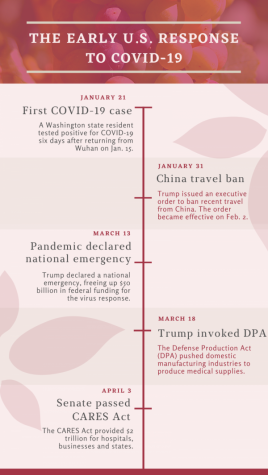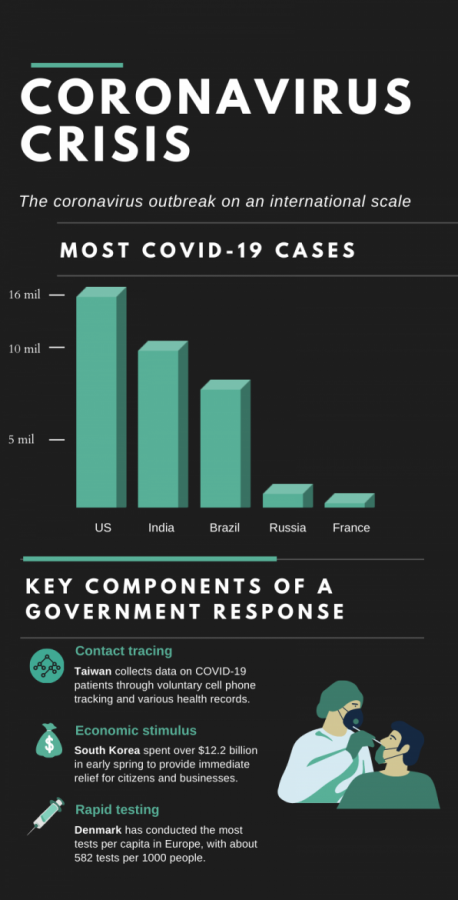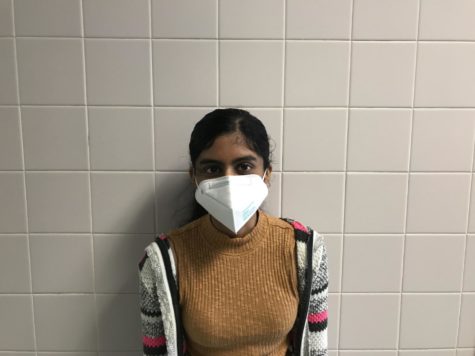US coronavirus response lags behind other countries
See John Hopkins University and the Foreign Policy magazine for more information.
December 17, 2020
While several countries have lifted their coronavirus restrictions and reopened safely, many other countries have been forced to reimpose lockdowns due to rising case numbers and inefficient coronavirus responses. America currently leads the world with over 12 million COVID-19 cases and 300,000 deaths, according to the Centers for Disease Control and Prevention.
From delayed lockdowns in March to the public spread of misinformation, the U.S. faced an outbreak response with adverse effects on public health and the economy. With many unable to afford medical care and continuing to work without paid leave, low-income communities faced a higher risk of exposure to the coronavirus and higher mortality rates, according to Time magazine. As household poverty worsens, schools and businesses continue to reopen nationwide.
“The U.S. did not do a good job because [many of us] did not listen to the warnings that medical experts gave us,” freshman Esther Min said. “The government should have had more involvement in lockdown and safety restrictions because there were too many people getting the coronavirus due to not heeding instructions.”
With a highly polarized political climate, the nation was split on the issues of lockdowns and mask mandates. Extremist groups have contributed to the resistance of these safety measures. QAnon, which Trump has publicly supported, spread conspiracy theories that accused the coronavirus of being a Democratic hoax. In addition, Trump’s downplaying of the virus in the early stages of the pandemic led many of his supporters to resist lockdown measures and participate in nationwide protests.
Safety restrictions faced opposition on the county level as well. On Nov. 18, Kansas governor Laura Kelly issued a mask mandate to combat a record increase in new cases. Sixty-two Kansas counties followed suit whereas 43 counties opted out of the order and chose not to require masks in public spaces. According to the University of Kansas, Kansas counties without mask mandates had higher case rates compared to counties that required masks.
“Political rhetoric converted a public health crisis into a partisan issue,” senior Adnan Rahimzai said. “Many rural Republicans associated lockdowns with the stripping of freedom, which was initially made popular by Republican leaders such as representative Andy Harris and others.”
Some believe that America’s case numbers would be lower if less testing occurred. However, despite having a population of over 23 million people, Taiwan has one of the lowest coronavirus counts in the world, with about 600 cases and just seven deaths, according to John Hopkins University. Through free and rapid testing, Taiwan curbed the spread of the virus within weeks of its initial outbreak.
“[Taiwan] was able to act fast and take control of their country instead of depriving people of going outside,” Min said.
Rather than shutting down the economy, Taiwan used contact tracing and mobile Sim-tracking to ensure that those who tested positive were following quarantine guidelines. Medical officials held daily briefings for the public and businesses remained open through extensive precautionary measures like taking temperatures and providing hand sanitizer for all patrons.
“Taiwan has one-fourteenth of the United States’ population and little ethnic and cultural diversity, which allows its government to administer control over its population more effectively,” Rahimzai said. “It is critical to note that [in America], many fundamental ideals vary significantly from state to state and county to county.”
South Korea’s coronavirus response also ranks among the world’s best, with about 35,000 total cases and 500 deaths. As a major global economy, South Korea has been exporting thousands of COVID-19 tests and medical supplies abroad since early March.
Not only did extensive, real-time tracking of COVID-19 patients contribute to a nationalized health system, but sizable government stimulus after the initial outbreak helped South Korea’s population recover from the economic costs of isolation.

“Government stimulus was an essential component of the coronavirus response,” senior Anina Jojo said. “Many people lost their jobs and had no steady income, so I am sure that stimulus checks were a relief for [South Koreans].”
Other countries were also renowned for taking earlier, more aggressive precautions to contain the virus. For instance, New Zealand started to implement preventative measures on Feb. 2, 2020, just three days after the World Health Organization declared the coronavirus outbreak a public health emergency. Mandating a nationwide lockdown since March 21, New Zealand was able to lift all restrictions except border controls by June as a coronavirus-free country.
“In America, the ban on travel from China was made effective on February 2,” Rahimzai said. “Timeliness is an area where people have been most critical of Trump, but I don’t imagine a Democratic administration would have done any better.”
After only a month of lockdown, Denmark was the first European country to reopen schools and businesses on April 17, alongside extensive testing initiatives implemented by the Ministry of Health. Hospitals were able to organize quick and efficient responses with Denmark’s universal access to health care, including 85% of costs funded by the government.
“The government should take a prominent role in public health because the faster we isolate this virus, the faster we can go back to a semi-normal life,” junior Miranda Schuman said.
Though COVID-19 vaccines have been developed, it would take months for the majority of the U.S. population to be vaccinated. In addition, vaccinated people may still spread the coronavirus and put their communities at risk, according to the New York Times. Thus, government mitigation strategies will continue to play an important role in public health.
“The lack of testing equipment, proper contact tracing and adequate infrastructure to produce medical supplies cost America dearly,” Rahimzai said. “Although America’s testing capabilities were better than most of the world’s, it still was a major shortcoming.”



